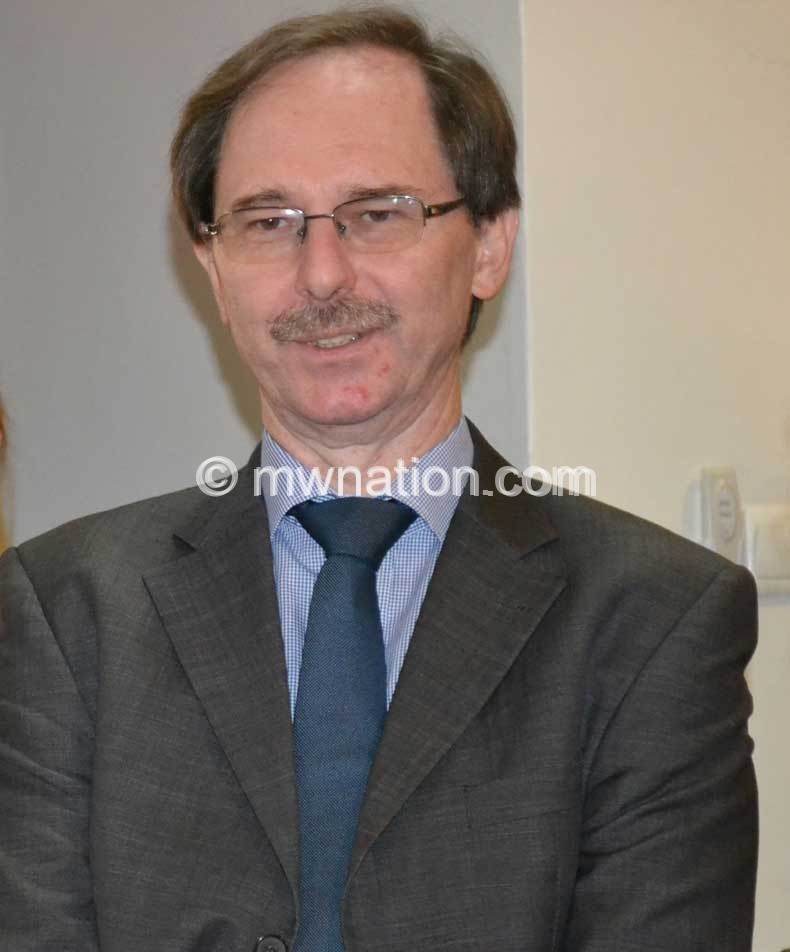Cabs disbanding, new donor group in offing
The Common Approach to Budgetary Support (Cabs)—as we know it—is being disbanded, Nation on Sunday has learnt.
Instead, it will be mutating to a different body following donors’ decision to indefinitely suspend direct aid to government, European Union Head of Delegation Alexander Baum said on Friday when we asked him to confirm reports that Cabs is breaking up.

Cabs—a group of donors providing General Budget Support (GBS) to the Malawi Government—takes a bow nine years after its inception and working to harmonise budget support disbursement and management.
Responding to an e-mail address on behalf of Cabs, Baum—the grouping’s current chairperson who was supposed to handover the leadership to the World Bank next month—said the group will have to undergo some modifications in the coming months.
This, he said, is because bilateral development partners (DPs) will, at least for the time being, not be able to provide budget support to Malawi.
Cabs comprises United Kingdom’s Department for International Development (DfID), European Union (EU), Norway, African Development Bank (AfDB) and the World Bank.
“The Cabs group will continue to exist even though its title may change. The future arrangements are yet to be discussed and agreed upon. They will also depend on the future aid coordination structure in the context of Malawi’s Development Cooperation Strategy,” he said.
Baum explained that some Cabs members have expressed their intention to provide aid to Malawi—at least for the time being—through project support.
“This shift is triggered by the assessment that using government systems carries currently too high fiduciary risks, which are assessed in different European countries as not acceptable.
“Any development partner has a legitimate interest in managing its fiduciary risks. We have all become increasingly aware of these risks in the Malawi context. The interest in managing public funds in a sound manner and for the benefit of the population— irrespective of their origin [aid or tax]—should be shared by all Malawians,” he said.
Baum added that the withdrawal of budget support as a preferred aid modality should provide a strong incentive for a comprehensive reform of Malawi’s Public Finance Management (PFM).
He noted that GBS was the most effective aid modality under the condition that funds are used for the intended purpose as it saves significant transaction costs—both in terms of human and financial resources—of project support.
“That is why a reform of PFM is critical for the return to the use of government systems in the near future,” he said.
Baum added that Cabs has undertaken regular coordinated review of the conditions around budget support, which has been an input to the decision for disbursement by its members.
“Regular reviews will have to continue, but they may change a bit in nature in the sense that they should be more technical and substantive than in the past. For the EU, this may require some minor adjustments to the Financing Agreement with government on budget support, but does not affect our GBS operations in principle,” he said.
Baum observed that Cabs has been a very useful platform for discussion between government and donors on conditions around budget support, including the fundamental principles, PFM and the national budget.
“This is why a continuation of such type of platform is needed in future. One conclusion is, however, that the Cabs review process has not been as effective as it should be. It did not prevent the PFM crisis and has not been an effective platform for a consultation process in the context of the budget preparation by government,” he said.
Ministry of Finance spokesperson Nations Msowoya said in an e-mail response: “As ministry of Finance, we are not aware of any decision by the Cabs to disband. However, as ministry we are aware that donors have expressed concerns because of weaknesses in [PFM] systems and as a result several development partners withheld their budget support.”
He, however, noted that the relationship with donors has evolved over time and this relationship has been a subject of several innovations in the past and Cabs is one such arrangement. Msowoya added that Cabs has been an important platform.
“To date Cabs has provided an important forum for policy dialogue between government and Cabs development partners, including observers on different issues ranging from macro-economic policy and governance. Through this partnership, Cabs DPs have been speaking with a common voice on issues of common interest,” he said.
Msowoya also added that if Nation on Sunday’s findings that Cabs is disbanding are true, it is the ministry’s view that disbanding of this partnership would reduce the development partners’ voice with government on key policy discussion since we would be discussing with them bilaterally, ending up in increased transaction costs.
University of Malawi’s Chancellor College professor of economics Ben Kaluwa said in a telephone interview on Friday that the donors’ decision to modify Cabs is a “big wake-up call” for Malawi.
Cabs started operating in 2005 with the aim of increasing aid absorption through the use of national financial management systems, strengthening national ownership in the execution of donor funded programmes through complete alignment of donor financed activities to development policies/objectives of the government, strengthening the use of evidence-based policy through policy dialogue with donors, and other government stakeholders as well as a quick disbursing of budgetary support.





